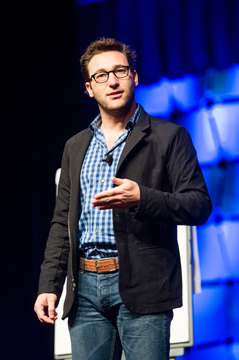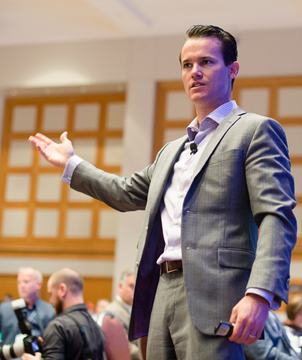Keynotes Simon Sinek And Peter Sheahan Challenge Attendees To Excel
NAFA's I&E regularly features keynote presentations that not only challenge the fleet professional, but the person within the profession, and the 2014 conference proved to be the most striking evidence yet of this.
 Simon Sinek, Author and Motivational Speaker, offered an inspirational—and scientific—discussion of leadership needs in one of I&E’s two keynote addresses. Sinek discussed four of the body’s chemicals, all of which showcase an aspect of leadership or how people want to be led.
Simon Sinek, Author and Motivational Speaker, offered an inspirational—and scientific—discussion of leadership needs in one of I&E’s two keynote addresses. Sinek discussed four of the body’s chemicals, all of which showcase an aspect of leadership or how people want to be led.
He cited how endorphins and dopamine -- two of the four chemicals -- create feelings of pride and a marker that shows progress. Without the other two -- serotonin and oxytocin -- "we would be selfish organizations," he said. "Organizations with weak cultures that are all about performance. People inside the organization can become addicted to making the numbers. Relationships are weak. These are weak organizations where people aren’t happy, don’t trust, and don’t cooperate."
Sinek detailed how members of the U.S. Marine Corps eat in order, from the lowest rank to the highest. This is Marine tradition, though it is not written in any rule book. Once, a Marine leader let his team eat first and the food ran out. "When they went back in the field, all of his men brought him their food," Sinek said. "When we feel like our leaders will sacrifice for us, we want to sacrifice for them. We all have the responsibility to be the leader we wish we had. When we are in need, it is our people who will come to our aid. If I were to ask your people, why would you help them? They would all tell me the same thing: because you would have done it for them."
 Meanwhile, Peter Sheahan, Founder and CEO of global consultancy ChangeLabs, provided the other keynote of the event. He gave an engaging and often humorous presentation Tuesday morning, using examples from major companies to discuss the transformation from aspiration to good idea, and good idea to great result.
Meanwhile, Peter Sheahan, Founder and CEO of global consultancy ChangeLabs, provided the other keynote of the event. He gave an engaging and often humorous presentation Tuesday morning, using examples from major companies to discuss the transformation from aspiration to good idea, and good idea to great result.
The process, according to Sheahan, is to embrace change sooner rather than later, when it will likely be more difficult; to take intelligent risks, remembering that "nothing changes if nothing changes;" to consider the "non-sexy" elements of innovation, including the how in addition to the what; and to continue increasing collaboration.
In terms of taking risks, Sheahan, author of six books including international bestsellers Flip and Generation Y, encourages pushing the envelope—but in a "super controlled way." Learn and make mistakes on a smaller scale, he said, "and you’ll be surprised by what people will or will not adopt."
With innovation, Sheahan suggests seeking not that which suits you or what you currently like to do, but rather that which "suits the outcome you want to create." Finally, Sheahan said he doesn’t see a future for fleet management that doesn’t involves much greater collaboration. "Transformation happens across the entire value chain," he said. "Work together to create the future."
 Simon Sinek, Author and Motivational Speaker, offered an inspirational—and scientific—discussion of leadership needs in one of I&E’s two keynote addresses. Sinek discussed four of the body’s chemicals, all of which showcase an aspect of leadership or how people want to be led.
Simon Sinek, Author and Motivational Speaker, offered an inspirational—and scientific—discussion of leadership needs in one of I&E’s two keynote addresses. Sinek discussed four of the body’s chemicals, all of which showcase an aspect of leadership or how people want to be led.  Meanwhile, Peter Sheahan, Founder and CEO of global consultancy ChangeLabs, provided the other keynote of the event. He gave an engaging and often humorous presentation Tuesday morning, using examples from major companies to discuss the transformation from aspiration to good idea, and good idea to great result.
Meanwhile, Peter Sheahan, Founder and CEO of global consultancy ChangeLabs, provided the other keynote of the event. He gave an engaging and often humorous presentation Tuesday morning, using examples from major companies to discuss the transformation from aspiration to good idea, and good idea to great result.